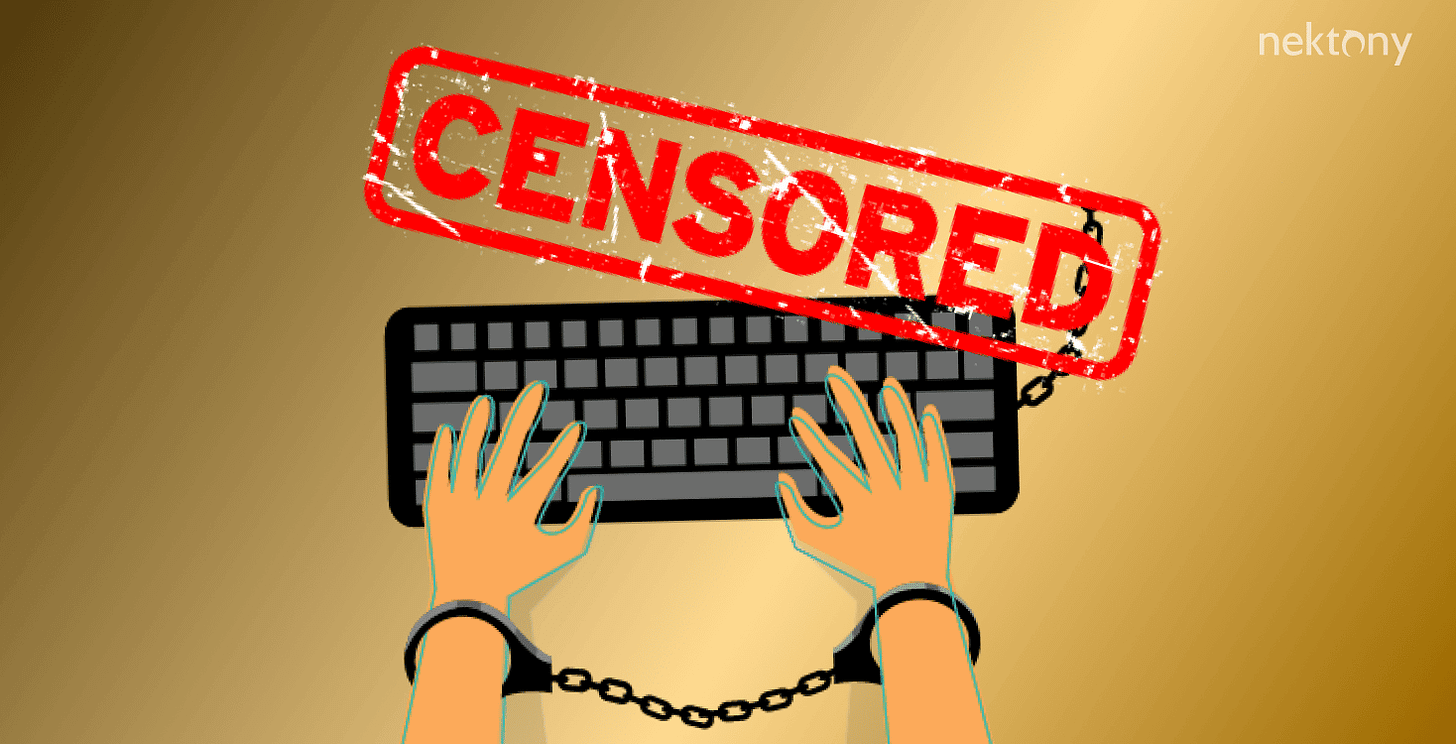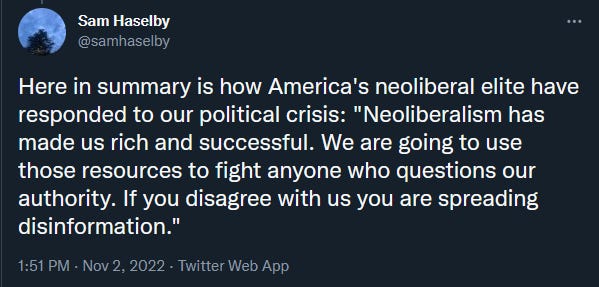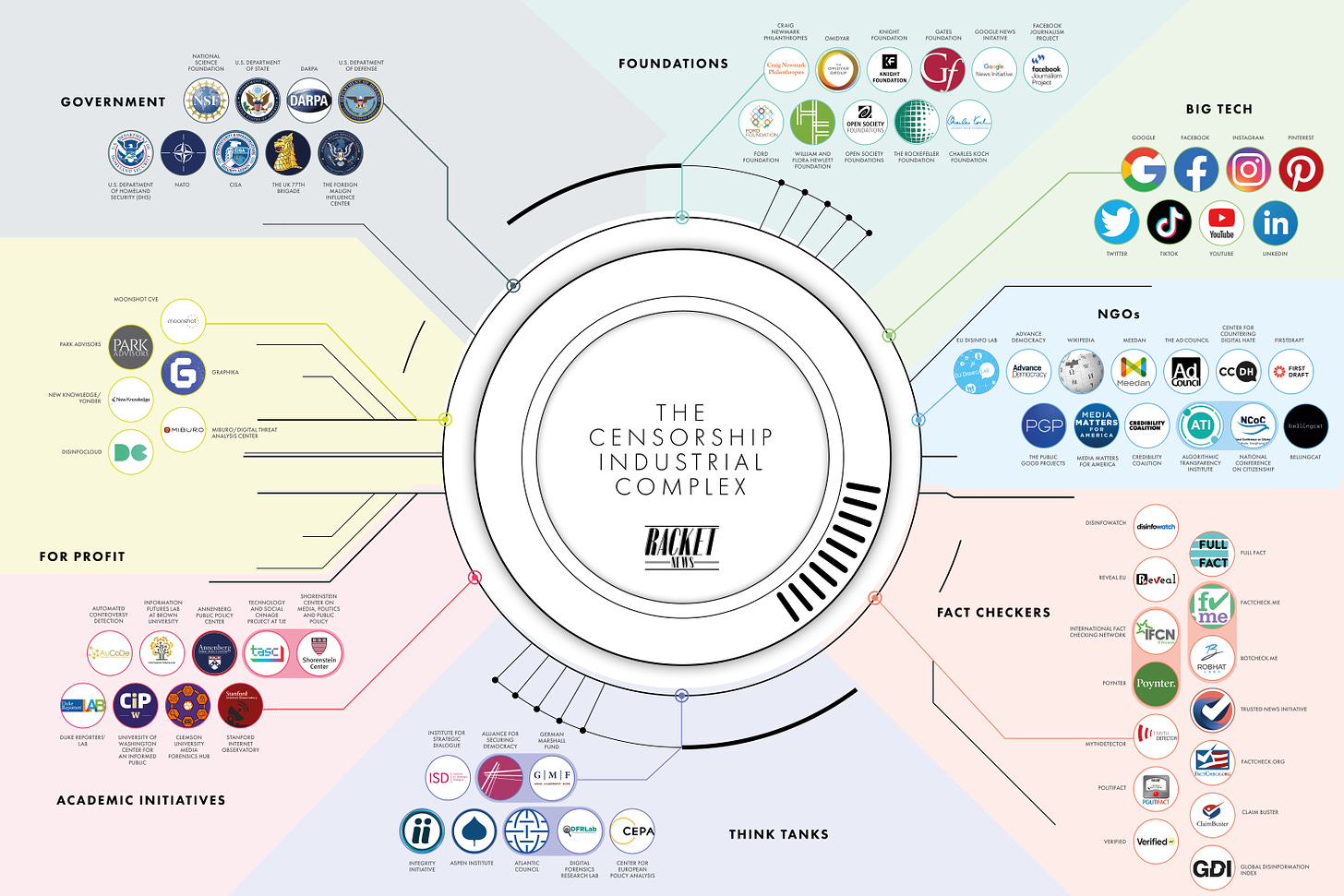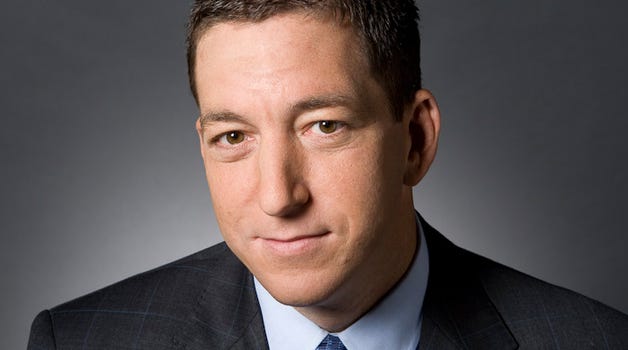The Censorship-Industrial Complex
A brief sketch plus some necessary reading recommendations
“There is growing evidence that the legislative and executive branch officials are using social media companies to engage in censorship by surrogate”
Jonathan Turley - Professor of Law at George Washington University
I used the above pull quote to introduce a short piece that I wrote last November about how privacy is a luxury of the past, and that we in the West now live in a surveillance state, facilitated by the collusion between government, big tech, and NGOs. You can read it here:
It was inspired by the launch of the Twitter Files, a public service courtesy of Elon Musk and his takeover of that social media platform. Giving access to select journalists to comb through available files, documents, and emails that he inherited from the ancien regime, we were given a peek behind the curtain to see just what was happening in the background. What we have learned since is that we all underestimated just how deep the collusion between the state, NGOs, big tech, and media was when it came to online censorship (“defending democracy from disinformation”, as per their words), their way of reasserting “narrative control”.
Despite the Internet growing out of a US military program, the early days of the World Wide Web were dominated by techno-utopianism. Information would be available to all at the click of a mouse, on a scale that would dwarf any major public library. This was the “democratization of information”, meaning that the gatekeepers of old would now be challenged and possibly be made redundant. Too much information via too many channels would make the task of funneling news and information simply too vast a prospect for editors in media, their corporate bosses, and the politicians and government officials that they favoured. The Internet let loose ‘information anarchy’.
With the mass adoption of the Internet, this created a problem for the powers-that-be. No longer would media be trusted like it once was, as people began to learn how the sausage was made, and most importantly, why it was made the way it was. People became savvy as to how news was packaged and delivered, and began to question its entire construction. Alternative media began to fill in this information gap, and alongside it came a groundswell in people questioning long-held shibboleths about governance and power. This is not to say that all non-mainstream media was somehow of a higher standard than traditional outlets, but there was enough quality on order to show everyone that they were being fed a lot of bullshit.
No longer was it easy to sell people the idea that a certain foreign leader was “Hitler”, or that the government of that country had to be removed one way or another. The Internet provided more than enough dissenting voices to pierce through the shoddy arguments of the old guard, and lots of people were interested in hearing these alternative voices. The powers-that-be had taken for granted their ability to force narratives onto the people for so long, that they were taken aback by the populist rebellions of both Trump and Sanders in 2016. Narrative control was lost.
There is no point in rehashing what happened during the Trump Presidency as it is a frequent subject on this Substack and elsewhere, and particularly because we all lived it and it is still fresh in our minds. Instead of doing that, I want you to think back to that brief period in time that was the summer of 2017 when Facebook’s Mark Zuckerberg was being touted as a POTUS candidate for 2020, one that could defeat Trump. Zuckerberg flew too closely to the Sun, and was quickly brought back down to Earth by Congress and national security officials, becoming one of the fall guys for Trump’s 2016 election victory. So thorough was his dressing down (and not just in front of Congress), that he and Facebook were quickly co-opted by the national security apparatus to do their bidding in the name of “fighting disinformation”. This new relationship was solidified when Meta (Facebook re-branded) announced its partnership with The Atlantic Council’s Digital Forensic Research Lab to identify “emerging threats and disinformation campaigns from around the world”:
Today, we’re excited to launch a new partnership with the Atlantic Council, which has a stellar reputation looking at innovative solutions to hard problems. Experts from their Digital Forensic Research Lab will work closely with our security, policy and product teams to get Facebook real-time insights and updates on emerging threats and disinformation campaigns from around the world. This will help increase the number of “eyes and ears” we have working to spot potential abuse on our service — enabling us to more effectively identify gaps in our systems, preempt obstacles, and ensure that Facebook plays a positive role during elections all around the world.
Facebook will also use the Atlantic Council’s Digital Research Unit Monitoring Missions during elections and other highly sensitive moments. This will allow us to focus on a particular geographic area — monitoring for misinformation and foreign interference and also working to help educate citizens as well as civil society.
Finally, we know that tackling these problems effectively also requires the right policies and regulatory structures so that governments and companies can help prevent abuse while also ensuring people have a voice during elections. The Atlantic Council’s network of leaders is uniquely situated to help all of us think through the challenges we will face in the near and long-term.
This effort is part of an broader initiative to help provide credible and independent research about the role of social media in elections, as well as democracy more generally. We look forward to working together to protect free and fair elections across the world.
Zuckerberg submitted and offered up his company to help those forces upset by the populist rebellion that not only catapulted Donald Trump into the White House, but which also decimated their shared monopoly on narrative formation and control.
This wasn’t the only initiative that was undertaken during the Trump era by national security players, Big Tech, NGOs, etc. in order to re-establish narrative control, but it was the one that most resonated with me due to the Atlantic Council’s participation. The Atlantic Council needs no introduction to readers of this Substack. Its existence is entirely devoted to serving US foreign policy ambitions. The fact that it would join in the “fight against disinformation” indicated that criticism of US adventurism abroad would also be put under the spotlight by these same ‘combatants’, as consent for future actions would need to be manufactured via newly-crafted narratives that were to be deployed, and with as little resistance as possible from critics.
Sam Hasselby, an old school liberal (open-minded and tolerant as to the opinion of others) and Senior Editor of Aeon, described this new fervour for controlling information thusly:
Sam eloquently described the mindset behind what has come to be known as the “Censorship-Industrial Complex” (CIC).
The CIC owes its very existence to Donald Trump, and specifically to the now-debunked conspiracy theory of Trump colluding with Russia to win the Presidency. Earlier this year, I urged everyone to read Jacob Siegel’s incredible piece on “The Hoax of the Century”. For those who haven’t done so yet, please do so, as it comprehensively goes through the entire history, and how it laid the groundwork for the CIC.
Earlier today, Racket News published a taxonomy of the CIC:
This was a monumental (and vital) effort, brought to us not just by
, but compiled by , , , , and four others. Out of their combined efforts comes this fantastic graphic that depicts 50 of the most important players in the CIC:The taxonomy is long, but it is also thorough for identified key organizations. We learn about their stated purpose, their activities to date, key figures in the organizations, funders, relationships to others in the infographic above (and beyond), and examples of how they worked to censor information on Twitter and elsewhere.
There are many things that you will immediately notice as you go through the piece. One is the revolving door between government and the private sector (especially natsec/intel veterans). Another one is how many of the funders of these organizations are already familiar to you (especially those reading the series on Colour Revolutions and Regime Change). Do a ctrl+c for each of the following: The Ford Foundation, Open Society (George Soros’ favourite personal vehicle), The German Marshall Fund, National Endowment for Democracy (NED), and The Rockefeller Foundation. They’re all there, several times over. They are all part of what is known as “The Deep State”, a term that “fighters against disinfo” loathe to hear, for obvious reasons.
Matt Taibbi seems to be making the mission of Racket News to be that of taking on the CIC. He is not alone in this battle. Other significant participants shining a light on the CIC include:
Michael Shellenberger and
of Public:Investigative Journalist Lee Fang:
“Bane of Bellingcat”
:…and last (but not least), Glenn Greenwald:
The anarchy of the World Wide Web is now ancient history, having first been pushed aside by monetization, and then buried by government-led weaponization. The West prides itself on being the bastion of “freedom and democracy”, but the freedom of the early Internet and the democratization of information came to be identified as threats to the existence of western liberal democracies.
It is this internal contradiction that forms the most important story of the past almost-decade, and is the one that requires the most attention from citizens seeking to be informed as best as possible in this increasingly-restrictive information environment. We do not expect freedom of speech from one-party dictatorship China, nor do we expect it from autocratic Russia. We cannot expect it from Europe either, where the CIC in the EU will be much more muscular and punitive than that in the USA.
The First Amendment is one of the cornerstones of the United States of America, which is why this contradiction must be continuously highlighted. As it stands now, this freedom must be eroded to protect freedom and democracy.
Disclosure: I have never met any of the people mentioned in this piece. I have traded emails and Twitter DMs with Glenn Greenwald, Lee Fang, and Leighton Woodhouse. I have never worked nor collaborated (except one interview with Greenwald) with anyone mentioned, whether personally or as part of an organization.













Hit the like button at the top of the page to like this entry. Use the share or re-stack buttons to share this across social media. Leave a comment if the mood strikes you to do so.
I put this together quickly this evening as I was inspired by the taxonomy in Racket News. They did a great job.
For those reading along to the Colour Revolutions and Regime Change series, you're gonna see a lot of familiar faces.
TL:DR: the censors have figured out that outsourcing the job to the tech companies not only insulates censorship from pesky civil rights suits, it also protects the censorship function from unwanted election results.
This is somewhat how Sheriff Buford was The Law in the Jim Crow Era South when it came to arresting civil rights protesters on the flimsiest of pretexts, but at the same time, just a private citizen exercising his fundamental rights when it came to attending KKK meetings.